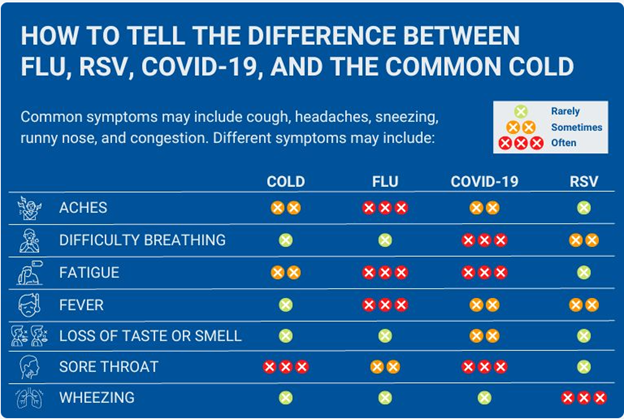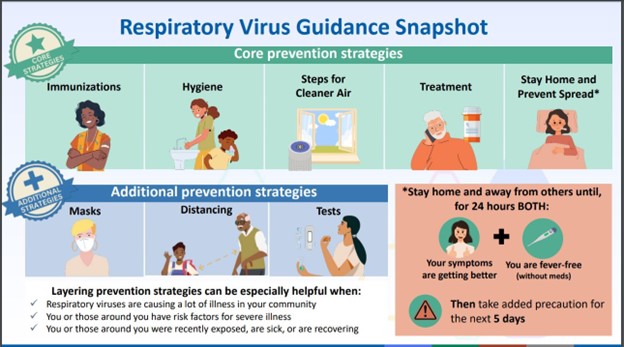Respiratory Viruses (COVID, Flu, RSV)
Respiratory viruses are viruses that cause illnesses in the respiratory system. These illnesses share similar symptoms, risk factors, and prevention strategies. Each year, respiratory viruses such as influenza (flu), COVID-19, and respiratory syncytial virus (RSV) cause hundreds of thousands of hospitalizations and thousands of deaths during the fall and winter virus season.
Symptoms
Respiratory viruses may cause both upper respiratory tract symptoms (the vocal chords and above) and lower respiratory tract symptoms (below the vocal chords). Some viruses also affect the nose, throat and lungs, and can lead to serious lung infections, such as pneumonia.
Examples of respiratory virus symptoms:
|
|
If you have an emergency warning sign (like trouble breathing or chest pain), seek emergency medical care immediately.

What to do when you test positive for COVID-19, Flu, RSV
AUCC has adopted CDC’s COVID-19 guidelines, please follow the general guidance below:
- Individuals who test positive for COVID will self-isolate for 2 days (from the day you test positive, or day symptoms began).
- Individuals can resume normal activities once their symptoms have improved and are fever-free — without fever-reducing medications for at least 24 hours.
- Individuals must take added precaution over the next 5 days (such as wearing a mask) when around others in doors.
- Report your positive test results by completing the AUCC SHWC Infectious Disease Reporting Form.
What to do when you are sick
CDC recommends when people get sick with a respiratory virus (COVID-19, flu, RSV) that they stay home and away from others.
- You can go back to your normal activities when, for at least 24 hours:
- Your symptoms are getting better overall, and
- You have not had a fever (and are not using fever reducing medication).
- When you go back to your normal activities, take added precaution over the next 5 days, such as wearing a mask, hygiene, physical distancing and/or testing when you will be around other people indoors.
Preventing Respiratory Viruses

CDC recommends that people use core prevention strategies. These are important steps you can take to protect yourself and others:
- Staying up to date with vaccination to protect people against serious illness, hospitalization, and death. This includes flu, COVID-19, and RSV if eligible.
- Practicing good hygiene by covering coughs and sneezes, washing or sanitizing hands often, and cleaning frequently touched surfaces.
- Taking steps for cleaner air, such as bringing in more fresh outside air, purifying indoor air, or gathering outdoors.
Resources for free individual COVID-19 test
Pre-registration for testing at the kiosks is not required but is available at https://register.testandgo.com/. There is no out-of-pocket cost for tests provided through a DPH kiosk, but for those individuals with insurance, their insurance will be billed for the test.
A map of kiosk locations and a short video about using the kiosks can be found at https://dph.georgia.gov/covid-19. Free test kits are also available statewide at county health departments.
Please use this link to get your Free at Home Covid Test Kits Covid-19 Test Kits.
Pharmacies and Clinics near AUCC for Immunizations
| Neighborhood Union Health Center | Walmart Pharmacy | CVS Pharmacy |
| 186 Sunset Avenue NW Atlanta GA 30314 |
835 M.L.K. Jr Dr NW Atlanta, GA 30314 |
895 Ralph David Abernathy Blvd SW Atlanta, GA 30310 |
| 770-520-7351 | 404-460-2703 | 404-755-1511 |
| 8:30-5PM, Mon-Friday (closed Sat and Sun) |
9AM-7PM, Mon-Sat 10AM-6PM, Sun |
9AM-9PM, Mon-Sat 10AM-9PM, Sun (closes 1:30-2PM for lunch) |
CDC’s Respiratory Virus Guidance
- Immunizations for Respiratory Viruses
- Hygiene and Respiratory Virus Prevention
- Taking Steps for Cleaner Air for Respiratory Virus Prevention
- Preventing Spread of Respiratory Viruses When You’re Sick
- Masks and Respiratory Virus Prevention
- Physical Distancing and Respiratory Viruses
- Testing and Respiratory Viruses

